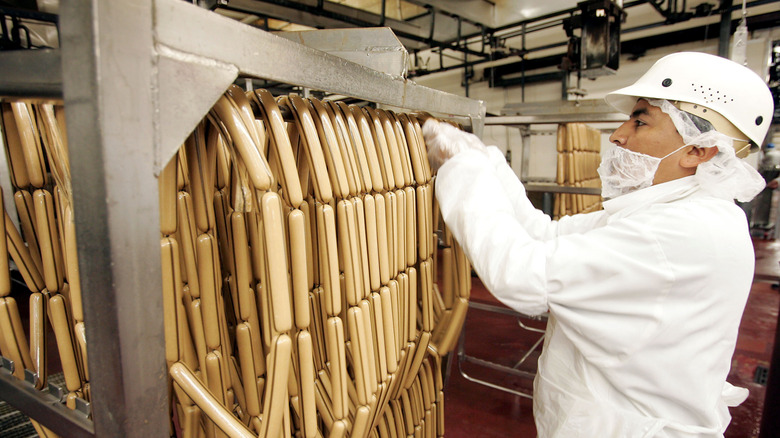Can You Buy Hot Dogs That Aren't Processed?
Not going to lie, when I first came to realize that hot dogs were essentially different ground-up meats mixed together, I was kinda grossed out and even went on a stint of not eating them as a kid. Fast forward to adulthood, and here I am, eating them again. Recently, I went down a sort of rabbit hole, doing a bit of research to see how things have changed and whether there are any hot dog options made from just one meat or free from a lot of preservatives.
This comes at a time when people are paying more attention to ingredients, sourcing, and food labels in general. Unfortunately, here's the hard truth: Hot dogs are, by definition, processed. It's kind of their whole deal. Now, that doesn't mean they're a candidate for the worst thing ever, but it does mean they've been through certain manufacturing steps (grinding, mixing, emulsifying), and curing to get their signature taste and texture.
However, the good news is that you're not without recourse if you're trying to avoid processed foods wherever possible. Just because you can't find truly unprocessed hot dogs doesn't mean that there aren't better options. If you really want to know what's in your food (more specifically, things like additives, fillers, or preservatives), some brands are better than others.
Some hot dog makers skip artificial flavoring, use higher-quality cuts of meat, and limit the use of preservatives as much as possible. These hot dogs aren't unprocessed, but they are more thoughtfully made. Understanding what's in your hot dog, rather than trying to find one that somehow isn't processed at all, is probably the better route to take to get the best hot dogs possible.
What to look for in a cleaner hot dog
Despite the processing, some hot dogs are made with much simpler ingredient lists than others. If you're looking for something closer to homemade, seek out brands that use grass-fed beef, organic ingredients, or pork from pasture-raised sources. Bonus: Grass-fed hot dogs often taste better, too. Again, these labels don't mean the hot dogs are unprocessed, but they do reflect a commitment to quality meat and transparency.
Brands like Applegate, Teton Waters Ranch, and even some regional butchers make hot dogs that are processed in a more straightforward way, often using 100% beef. They'll still have that familiar snap and flavor, but they tend to skip the artificial coloring and excess sodium often found in mass-market options. If hot dogs are an occasional treat, you're likely doing just fine, especially if you just look a little closer at the ingredient list before you purchase.
The truth about nitrites and uncured hot dogs
One of the biggest concerns people have with processed meats like hot dogs is nitrites. These preservatives are used to keep the meat fresh-looking and shelf-stable, but they've also been linked to health risks when consumed in large quantities. Some of your "cleaner" hot dog options are often labeled as "uncured," though it's worth noting that even these still go through a curing process — just using vegetable-based nitrites instead of synthetic ones.
Vegetable nitrites are derived from natural sources like celery juice or powder. Your body processes them in the same way as synthetic nitrites, which means "uncured" doesn't necessarily mean "nitrite-free" in the way many shoppers assume. These natural versions are often marketed as the healthier alternative, but the science around whether they're any better is still being debated.
That distinction can be a little confusing, but if you're trying to avoid synthetic preservatives, "uncured" might be worth considering. The goal shouldn't necessarily be to eliminate every trace of preservatives, but rather to understand what you're eating and make informed choices. So no, there's no such thing as an unprocessed hot dog ... but there are better ones out there. It all comes down to reading labels, choosing thoughtfully, and not expecting a centuries-old processed meat to suddenly be something it's not.


